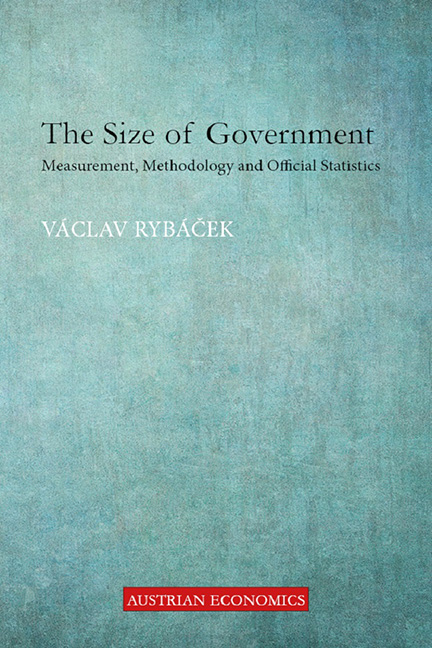Book contents
- Frontmatter
- Contents
- Introduction
- Chapter 1 The Size of Government in Economics
- Chapter 2 The Role of Measuring Government in Economic Policy
- Chapter 3 A Short Trip to the Past
- Chapter 4 The Current Approach
- Chapter 5 What’s Wrong with the Current Approach?
- Chapter 6 The Size of Government and GDP
- Chapter 7 Is the Size of Government Underestimated?
- Chapter 8 Recalculation of the Size of Government
- Conclusion
- Notes
- Bibliography
- Index
Chapter 3 - A Short Trip to the Past
Published online by Cambridge University Press: 09 August 2023
- Frontmatter
- Contents
- Introduction
- Chapter 1 The Size of Government in Economics
- Chapter 2 The Role of Measuring Government in Economic Policy
- Chapter 3 A Short Trip to the Past
- Chapter 4 The Current Approach
- Chapter 5 What’s Wrong with the Current Approach?
- Chapter 6 The Size of Government and GDP
- Chapter 7 Is the Size of Government Underestimated?
- Chapter 8 Recalculation of the Size of Government
- Conclusion
- Notes
- Bibliography
- Index
Summary
To understand the present, we shall make a short trip to the past. Luckily, we do not have to go too far back. At the time of writing there are still people living who can remember the advent of macroeconomics and macroeconomic statistics. Actually, societies had been functioning well before statistical institutes began to rattle off the tremendous volume of macroeconomic aggregates and all the related figures. How is it, all of a sudden, that we can hardly imagine living without these macroeconomic statistics? Indeed, do we really need this kind of information?
Our would-be need for macroeconomic statistics depends substantially on our economic position in the society today. Undoubtedly, members of a state-less society would see hardly any benefits in having macroaggregates at hand. But even now, in those societies that don’t come close to being “state-less”, most entrepreneurs hardly base their decisions on changes in GDP or in general price level; they would rather think of individual prices on local markets, they formulate their own expectations about future demand for individual products. Obviously, it also holds true for consumers who base their decisions on their personal incomes, family situation or subjective judgements. In their daily lives, individuals are not much interested in figures that tell them nothing about their individual situation or about the situation of their individual markets.
Nevertheless, we do not live in a state-less society. The state has become virtually omnipresent entering or aiming to enter into each and every economic relation on the market, aiming at stabilizing the economy and ensuring accessibility of certain goods and services as a reflection of its own policy. All this effort is translated into a bewildering patchwork of regulatory acts. To perform its agenda, the state needs to have statistical data. This is not surprising; the situation of politicians may be likened to any company’s owner who needs accounting information to manage its business. So do politicians. This brings us straight to the source of demand for macroeconomic statistics; it originates in politics and various state policies evolving over decades.
- Type
- Chapter
- Information
- The Size of GovernmentMeasurement, Methodology and Official Statistics, pp. 47 - 58Publisher: Agenda PublishingPrint publication year: 2019

